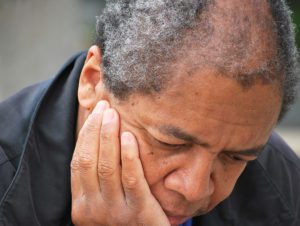
Now is a great time to find out more about depression among seniors. Experts say that depression affects more than six million seniors who are 65 or older. Seniors have a higher risk of developing depression than other segments of the population. And many seniors who have depression go undiagnosed or untreated. Medication can help seniors who are depressed in many cases so it’s important that seniors get diagnosed if they are showing symptoms of depression. If you or their elder care providers have noticed symptoms of depression in your senior loved one or if your senior loved one has one of the many risk factors for developing depression you should talk to your loved one’s doctor.
Symptoms of Depression
The most common symptoms of depression in seniors include:
- Feelings of hopelessness and/or pessimism
- Feelings of guilt, worthlessness and/or helplessness
- Irritability, restlessness
- Loss of interest in activities or hobbies once pleasurable
- Fatigue and decreased energy
- Difficulty concentrating, remembering details and making decisions
- Insomnia, early–morning wakefulness, or excessive sleeping
- Overeating or appetite loss
- Thoughts of suicide, suicide attempts
- Persistent aches or pains, headaches, cramps, or digestive problems that do not get better, even with treatment
Some of these symptoms can be side effects of medication, so you might want to double check the medication that your senior loved one is taking and make sure they are not getting too much and that they are still taking their medications as prescribed. An elder care provider who visits on a regular basis can be a big help for seniors who need help managing their medications. An elder care provider can also log all the medications that your senior loved one takes along with any changes in behavior or attitude that they notice. That information can be very helpful to your senior parent’s doctor.
Risk Factors For Depression
Even though many seniors and their families assume that feeling “blue” or not having a lot of energy are just part of aging they’re really not. Risk factors like these can increase the chances that your senior loved one will develop depression:
- Living alone
- Being socially isolated
- Grieving after the death of a loved one
- Not eating regularly or not eating healthy food
- Not getting enough sleep or getting restful sleep
- Living a sedentary lifestyle
- Having two or more serious medical conditions
- Having chronic pain
- Being disabled or unable to take care of themselves easily
- Family history of depression
- Taking medications that can cause depression
These risk factors don’t mean that your senior loved one will absolutely develop depression. However, if your senior parent has two or more of these risk factors they have a higher than normal chance of becoming depressed so it’s a good idea to pay close attention to their attitude and behavior. If you or their elder care aides notice any changes in their attitude or demeanor then you should talk to their doctor about the changes you have noticed. Seniors don’t have to struggle with depression by themselves.
Sources: https://www.cdc.gov/aging/depression/index.html
https://www.webmd.com/depression/guide/depression-elderly
